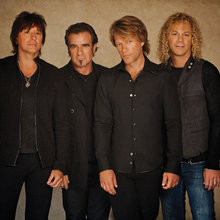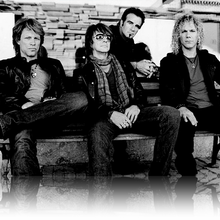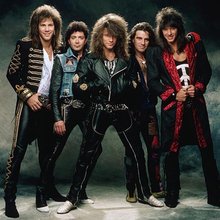Like an American Def Leppard with a Bruce Springsteen fixation, Bon Jovi used good hooks, pumped-up production and stadium-sized passion to forge the pop-metal alloy that made them one of the dominant mainstream rock bands of the Eighties.
As a working-class teenager, John Francis Bongiovi, Jr. (born March 2nd, 1962 in Perth Amboy, New Jersey) showed little interest in school, preferring to sing with his friend David Bryan Rashbaum in local bands. Cousin Tony Bongiovi, owner of New York City's Power Station recording studio, let Bon Jovi sweep floors there and record demos with such musicians as Aldo Nova and members of Springsteen's E Street Band.
The nucleus of the Bon Jovi band — Rashbaum on keyboards, Dave Sabo on guitar, Alec John Such on bass and Tico Torres on drums — played clubs to support local radio play for their demo. PolyGram won a record label bidding war (reportedly signing only John Bongiovi, with the rest of the band as his employees) and had the Italian-American Bongiovi de-ethnicize his name to Jon Bon Jovi (keyboardist Rashbaum dropped his surname, becoming simply David Bryan). After seeing Bon Jovi at a New Jersey club, guitarist Richie Sambora auditioned and replaced Sabo (later of Skid Row).
Bon Jovi's self-titled debut album (Number 43, 1984) included the hits in "Runaway" (Number 39, 1984) and "She Don't Know Me" (Number 48, 1984). But Tony Bongiovi sued the band, claiming he had helped develop its sound; Jon Bon Jovi called his cousin's influence "slim to none," but settled out of court. Their next album, 7800° Fahrenheit (Number 37, 1985), went gold.
Bon Jovi then made two crucial marketing moves: bringing in composer Desmond Child (former leader of the Seventies New York disco-rock band Rouge, he also wrote for Aerosmith, Cher and Kiss) as a song doctor, and basing the next album's content on the opinions of New York and New Jersey teenagers for whom they played tapes of more than 30 possible songs. The resulting selections formed Slippery When Wet (Number One, 1986), which sold more than 12 million copies with the help of some startlingly un-metal synthesized hooks and straightforward performance videos that showcased the videogenic band. Hit singles included "You Give Love a Bad Name" (Number One, 1986), the hardscrabble romantic anthem "Livin' on a Prayer" (Number One, 1986) — both of which Child cowrote — and "Wanted Dead or Alive" (Number Seven, 1987). The latter, perhaps in part due to Bon Jovi calling himself a "cowboy," would be covered by more than one Nashville country act a couple decades down the line.
The Slippery formula was followed for New Jersey (Number One, 1988), which sold more than seven million copies and contained five Top Ten hits: "Bad Medicine" (Number One, 1988), "Born to Be My Baby" (Number Three, 1988), "I'll Be There for You" (Number One, 1989), "Lay Your Hands on Me" (Number Seven, 1989) and "Living in Sin" (Number Nine, 1989). In the midst of a 1989 tour Jon Bon Jovi married his high school sweetheart Dorothea Hurley in Las Vegas (they have two children). Sambora dated Cher for a while, and Bon Jovi backed her on some tracks on her 1989 Heart of Stone album. In 1994 Sambora married actress Heather Locklear (the pair's separation became prime tabloid fodder in 2006). Later in 1993 Bon Jovi played the Soviet Union in the Moscow Music Peace Festival — arranged as part of a community-service sentence on Bon Jovi's manager Doc McGhee, who in 1988 had pleaded guilty to drug-smuggling charges from a 1982 arrest.
After 18 months of touring, the band members went separate ways. Jon Bon Jovi's solo album Blaze of Glory (Number Three, 1990) — recorded with Jeff Beck, Elton John, Little Richard and others — yielded hits in the title track (Number One, 1990) and "Miracle" (Number 12, 1990). Blaze was the soundtrack for the movie Young Guns II, in which Bon Jovi had a bit part, and the album earned both Oscar and Grammy nominations. The following year Sambora released his first solo album, Stranger in This Town (Number 36, 1991). Bon Jovi ended a year of breakup rumors with a Tokyo concert on December 31, 1991. The band then recorded Keep the Faith (Number Five, 1992), which produced hit singles in the title track (Number 27, 1993) and "Bed of Roses" (Number 10, 1993). Another hit, "Always" (Number Four, 1994), emerged from Bon Jovi's 1994 anthology, Cross Road (Number Eight).
In 1995 the band released These Days (Number Nine). After a full-scale world tour, the band went on hiatus. Jon Bon Jovi took a role in the 1995 film Moonlight and Valentino, and continued acting throughout the Nineties, appearing in Ed Burns' No Looking Back and the World War II submarine adventure U-571. In 1997 he released his first official non-soundtrack solo album, Destination Anywhere (Number 31, 1997). The following year Sambora released his second solo album, Undiscovered Soul.
Bon Jovi regrouped in 1999 with to record "Real Life" for the EdTV soundtrack. The following year, the band released Crush (Number Nine, 2000), collaborating with Swedish teen-pop svengali on the hit single "It's My Life" (Number 33, 2000), which included sound-effect hooks that harked back to the band's Eighties singles. Demand for Bon Jovi's old-style pop-metal turned out to be so big that, since the reunion, the band has gone on to release more successful albums than it did even during its pin-up prime. Crush went double platinum in the U.S. and sold 8 million copies worldwide. After a successful tour, Bon Jovi returned with Bounce (Number Two, 2002. And to keep momentum with their younger audience, Bon Jovi had adopted a more alternative-rock look and sound and played dates with the alternative-identified pop-rock band Goo Goo Dolls. For This Left Feels Right (Number 14, 2004), the band re-recorded some of its biggest hits as slowed-down adult contemporary songs. The four-disc box set 100,000,000 Bon Jovi Fans Can't Be Wrong (Number 53, 2004) — the title and packing art playing on the similarly titled Elvis Presley album — compiled 50 rare and unreleased tracks and a behind-the-scenes DVD.
Bon Jovi returned the following year with an album of new material, Have a Nice Day (Number Two, 2005), which produced not only a pop single in the title track (Number 53, 2005) but also the band's first country crossover hit, "Who Says You Can't Go Home" (Number One Hot Country, 2005; Number 23 pop, 2006). The duet with singer Jennifer Nettles of the country band Sugarland won a 2007 Grammy for Best Country Collaboration with Vocals. The twangy move suited the changing tastes of aging Bon Jovi fans, many of whom had begun listening to the more adult-contemporary, rock-oriented sounds of post-Garth Brooks country radio. After releasing a live disc and comprehensive greatest-hits package in 2006, Bon Jovi's next album of new material, Lost Highway (Number One, 2007), was marketed more directly to the country audience, with country-charting singles "(You Want to) Make a Memory" (Number 27 pop, Number 35 Hot Country, 2007) and "Till We Ain't Strangers Anymore" (Number 47 Hot Country, 2007), a duet with LeAnn Rimes. To support the record, the band recorded an episode of MTV's Unplugged.
But the band's next album, The Circle, was more rock than country; it debuted at Number One in Billboard in November 2009, five months after Jon Bon Jovi and Richie Sambora's induction into the Songwriter's Hall Of Fame. At decade's end, Billboard ranked Bon Jovi as the ninth highest grossing touring artist of the 2000s; The Circle Tour, scheduled to begin in early 2010, was slated to be their biggest and most extensive since their late Eighties hair-metal heyday.
Inside Out and What About Now (2012–present)
In January 2012, Jon Bon Jovi stated that they were working on a twelfth studio album, and in a live show in August 2012, Jon Bon Jovi played an acoustic version of a song that was announced to be on the upcoming album.
In October 2012, Bon Jovi announced Because We Can, a new world tour for 2013, in support of their new album, What About Now, which was released on March 12, 2013. The tour started in February 2013 and visited North America, Europe, Africa, the Far East, Australia and Latin America.
On November 27, 2012, Bon Jovi released a new live video album, called Inside Out, made up of content from shows at the O2 Arena, MetLife Stadium, and Madison Square Garden. The album was first shown at movie theaters, with screenings preceded by a question-and-answer session with Jon Bon Jovi, Richie Sambora, David Bryan and Tico Torres streamed live from a theater in New York, and was subsequently made available for purchase on iTunes.
On March 14, 2013, Bon Jovi appeared on the results show of American Idol and played one song, Because We Can, from their new album What About Now.
From 2 April forward, Richie Sambora departed the band's ongoing tour for unspecified "personal reasons"; Phil X once again replaced him, this time for the remainder of the tour, amidst rumours that Sambora had been fired. Both Sambora and Jon Bon Jovi later denied the claim. Tico Torres was also sidelined briefly due to emergency gallbladder surgery; he was replaced by Rich Scannella from Bon Jovi's solo band, the Kings of Suburbia, from 20 September to 6 October.
Discography
· Bon Jovi (1984)
· 7800° Fahrenheit (1985)
· Slippery When Wet (1986)
· New Jersey (1988)
· Keep the Faith (1992)
· These Days (1995)
· Crush (2000)
· Bounce (2002)
· Have a Nice Day (2005)
· Lost Highway (2007)
· The Circle (2009)
· What About Now (2013)


